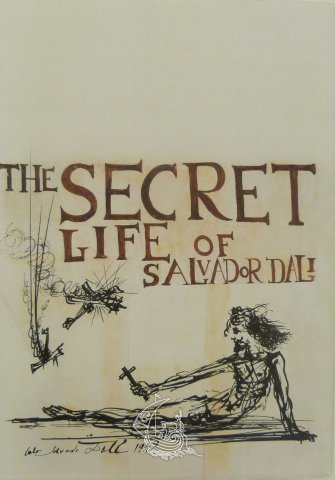The Gala-Salvador Dalí Foundation and Girona Provincial Council have inaugurated an exhibition of the original drawings of The Secret Life of Salvador Dalí.
The Chairman of the Gala-Salvador Dalí Foundation, Ramon Boixadós, the Director of the Dalí Theatre-Museum of Figueres, Antoni Pitxot, and the Chairman of Girona Provincial Council, Carles Páramo, inaugurated the exhibition of 126 original drawings from The Secret Life of Salvador Dalí on July 26 beneath the dome of the Dalí Theatre-Museum in Figueres. The event was also attended by the Dalí Year Commissioner Montse Aguer, the Provincial Culture Deputy Enric Vilert, the Provincial Council's cultural Coordinator Ramon Moreno, the Mayor of Figueres Joan Armangué, and the Councillor for Culture Isabel Pineda.
Ramon Boixadós thanked the owner of 124 of the 126 drawings exhibitedfor his kindness in lending the works, as well as Girona Provincial Council for sponsoring the exhibition under the collaboration agreement signed on last 25 June. Carles Páramo expressed great pleasure in taking part in Dalí Year with an exhibition which content was of such importance for Dalí, and he thanked the Foundation for the opportunity to promote the city of Girona through the image and work of Salvador Dalí, for the Costa Brava Girona Tourist Board has been emphasizing the artist relationship with his land that made a mark on Dalí's oeuvre and personnality.
The Secret Life of Salvador Dalí
The exhibition gathers 126 original illustrations of the 136 the artist created for the first edition of The Secret Life, dating from 1942. The technique used in most of them is India ink on paper. Of the 126 drawings exhibited, two are from the Gala-Salvador Dalí Foundation's own collection.
Salvador Dalí wrote his autobiography at a relatively young age, when he was 37 to 38 years old. In the prologue to the first volume of the Complete Works of Salvador Dalí published by Destino, Fèlix Fanés, professor of art at the Autonomous University of Barcelona and advisor at the Dalí Foundation Centre for Dalinian Studies, offered three possible explanations for the artist having written rather premature memoirs. "Maybe he had so much to recount that he could not postpone the account of his life until a more advanced age . Or perhaps he found himself at such a crucial time of change in his oeuvre that he had to stop and take some perspective at the work achieved so far. Or was it that he felt it necessary to write - rather rewrite - his story in order to expunge from it certain youth political and artistic temptations at a time when he had to present himself immaculate in front of the (presumably conservative) American public that he aspired to conquer? It's hard to say. All three hypotheses are quite reasonable, and are not necessarily exclusive ". Antoni Pitxot highlighted the zeal and enthusiasm Dalí brought to the self-analysis of his memories and experiences, while at the same time reaffirming himself as a "voyeur", in this case of himself. As the dutiful son of a public notary, Dalí recorded many of his experiences by executing ink-on-paper drawings that he gathered over the course of thirty years and that he brought together in The Secret Life. Montse Aguer reviewed some of the drawings for the press, mentioning the one dedicated to the comic-strip character Patufet, whom Dalí called the "Catalan hero", an F.A.I. (Iberian Anarchist Federation) militiaman who filled a glass with his own blood, as well as a drawing with clear Picassian influence which might have been a sketch for the oil painting the Foundation presented this year, Women Reclining on the Sand, and a portrait of Freud with snail-like brain
The autobiography The Secret Life of Salvador Dalí is a magnificent tool for deciphering a goodly part of the Dalinian code. The exhibition can be seen on the third floor of the Dalí Theatre-Museum of Figueres (Room 13) until 31 December of 2004.








